VOL. 45 | NO. 12 | Friday, March 19, 2021
Over the Cumberland, around the world
By Tom Wood
Josef Newgarden has a very simple explanation for why Nashville seemingly has become the center of the motor sports universe.
Or more fittingly, as Newgarden suggests, on center stage in Music City.
“Well, I see Nashville becoming the entertainment capital of the United States, certainly, and possibly worldwide. It’s a city that is primed for events,” says Newgarden, a homegrown favorite contender to win the inaugural Music City Grand Prix Aug. 8.
The NTT IndyCar street race – set for a 2.17-mile downtown course that begins at Nissan Stadium and crosses the Cumberland River – could draw more than 100,000 to the three-day event, reach an international television audience in more than 150 countries and boost tourism with an economic impact of more than $20 million.
“My personal viewpoint is that Nashvillians and this city perform events almost better than anywhere else,” adds Newgarden, 30, who grew up in Hendersonville before embarking on his racing career. “You have tremendous support from people with whatever is going on, whether it’s the Predators, the Titans or other one-off events that come into the city.
“You’re seeing people recognize Nashville as a great destination for that and they’re wanting to be a part of this city and a part of the impact that sports have here in this town. So I think it’s natural for motor sports to jump on that and be involved in this city. And I think IndyCar’s perfect for that.”
The Grand Prix isn’t the only race in Music City.
NASCAR brings a Cup Series race back to the Midstate for the first time in 37 years when Nashville Superspeedway hosts the Ally 400 June 20 in Gladeville, about 18 miles south of Lebanon. It will be the 1.33-mile track’s first race since a 2011 shutdown and the first Cup race here since 1984 at the old Nashville Fairgrounds short track.
In December, NASCAR returns to Nashville for its Champions Week and Cup Series Awards after canceling the 2020 gala due to COVID-19 concerns.
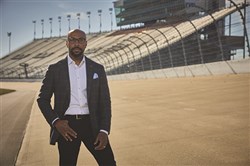
Erik Moses, a graduate of the University of North Carolina and Duke University School of Law, is president of Nashville Superspeedway,
“I have told people that we are as excited as we can be about introducing the country to how Nashville will do NASCAR,” says Erik Moses, president of Nashville Superspeedway. “We have no reason to believe that reception will be any different than it was for our Champions Week celebration in December 2019 where we had burnouts on Broadway and having thousands of people there to witness that and to enjoy the celebration and festivity.
“So yeah, I agree with (Newgarden.) Nobody does a party like Nashville. And I think everybody wants to be a part of that.”
Big things also are happening at Fairgrounds Speedway. The 0.5996-mile track will host two major televised events this summer – the ARCA Menard East Series’ Music City 200 May 8 and the SRX (Superstar Racing Experience) finale July 17 featuring racing legends Tony Stewart, Ray Evernham, Michael Waltrip, Tony Kanaan, Helio Castroneves, Willy T. Ribbs, Bill Elliott, Marco Andretti and others.
But the biggest development came March 5 when Mayor John Cooper signed a letter of intent with Bristol Motor Speedway to modernize the historic track with the goal of bringing NASCAR racing back to the track that first opened in 1904. The Fairgrounds is also the site of a Major League Soccer stadium being built by Nashville SC.
“The goal of the partnership is to bring our historic racetrack back to life as a valuable and exciting part of the Fairgrounds,” Cooper says.
Here is a closer look at issues facing the Music City Grand Prix and other motor sports:
More than cars, racing
Think of the Music City Grand Prix as Nashville’s version of the Kentucky Derby, one fueled by horsepower and the other running on horse power. But there are other similarities, beginning with the festival atmosphere.
And that’s been the plan all along, say Grand Prix organizers Christian Parker (president), Matt Crews (CEO) and Jason Rittenberry (COO).
“We stress all the time that we are many things beyond the race. Racing is a facet of what we’re doing but we’re really doing is a festival. We’re a party. We’re a cultural phenomenon that’s being held in downtown Nashville,” says Parker, a former Predators executive.
“And so, we’re bringing in and playing off all the things that Nashville does well all the time and then just layering on some racing. So the music, the food, the fun, the entertainment – all of those things are huge components of what we do. Racing happens to be one other.”
Crews, a record-setting placekicker for Middle Tennessee State University before getting into racing, says music and hospitality are as important as the racing.
“Nashville as a community, we know how to take care of guests. Everything we talk about here is the guest experience and that’s so important,” says Crews, a former president of the Baker Curb Racing NASCAR team. “Nashville is going to do a great job of taking care of our visitors, (and) it’s our job not to mess that up.
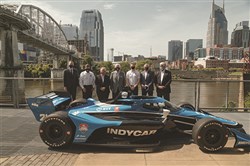
Yes, it’s going to be hot in August, but the date is almost as important as the visuals that will be created during the inaugural Music City Grand Prix.
-- Photograph Provided“But again, this at its core is a festival and IndyCar is a big part of that. We have other racing – the TransAm Series and the GT America Series will be competing – but it’s just much of a music and food festival as it is a motor sports event.”
Adds Parker: “Our hope – or even our expectation – is that 50% of the people who come to our event are not race fans and may not even … watch the race,” Parker says. “They’re there for all of the other reasons.
“They’re there for the concerts, they’re there for the culinary, they’re there to socialize, they’re there for the downtown party and if they happen to see a race car at some point in time, well, that’s a positive.”
International appeal
While sports events like the SEC men’s basketball tournament and the Superspeedway’s Ally 400 certainly boost tourism, the Music City Grand Prix could increase international travel.
“(Nashville is) a destination city on an international level,” says Rittenberry, who previously led the Circuit of the Americas of the Formula 1 U.S. Grand Prix event in Austin. Texas. “The race fans and even the drivers are excited about coming, so we anticipate this to be huge success from the international standpoint
Crews sees the Grand Prix becoming “one of Nashville’s biggest annual events for decades to come.
“We’ve always kind of had our eye toward the international growth of tourism in Middle Tennessee,” he adds. “We feel like that really dovetails nicely into the expansion of the airport with a focus on international flights as well, so that’s kind of been one of the overarching visions from day one – let’s grow our footprint. And nothing does that more than an international motor sports, music and food festival.”
But a race on the first weekend in August? The average temperature in Nashville for Aug. 8 is a humid 90 degrees. Crews says the date was intentional and involved:
• Locking down a five-year date with broadcast partners
• Working around the Titans’ use of Nissan Stadium
• Taking advantage of when Europeans schedule vacations
“So you start trying to thread the needle,” Crews explains. “It’s summer in Tennessee, but we’re a summer festival, no different than the musical festivals that take place across America during the summer, as well.”
Parker says the Grand Prix has the potential “to be a very significant economic catalyst, a significant economic driver,” adding, “The fact that you’re bringing people from all over the country, that you’re bringing people in from international destinations is bound to have significant impact on hotels, restaurants, tourism, travel dollars at BNA and so forth.
“We think that we can regularly draw from large metropolitan markets in Europe, whether that is in Germany or in England or in France or in Sweden or Spain, not to mention Japan, not to mention Australia, not to mention Central or South America.”
Bridge racing excites Newgarden
While the Tony Cotman-designed course layout over the Korean Veterans Memorial Bridge and the Cumberland River isn’t the first to cross a body of water, it is the longest at 600 yards – the equivalent of six football fields.
“It’s definitely the longest stretch of bridge the IndyCar Series has ever run on,” Newgarden says. “I’ve never run across a body of water so it will be unique for me and it will be unique for all the other drivers. But I think it’s going to be epic.
“Running across that will be a sight to behold, I think. I believe it will create the most beautiful helicopter shot for broadcasting amongst any track that we go to ... a really pretty shot of the city and it’s going to look super unique for racing.”
While the Grand Prix was initially promoted as the first race to cross a body of water, Rittenberry says Formula 1 officials corrected them.
“The other times in history when it’s been done have been very small sections over smaller bodies of water, not to the extent of ours, that high in the air above the body of water and for 600 yards,” he says.
“That makes it one of the longest straightaways in all of IndyCar … their entire schedule. And we’re doing it on the streets of downtown Nashville.”
Crews calls the bridge crossing – with the sound of engines echoing off downtown glass office towers – a Nashville showcase.
“We’re fixing to show Nashville to the world, and if you’re going to do that, you want to show them their best side. Take the racing component out of it. The true, best view of the city is the bridge,” Crews says.
“The bridge is more and more the iconic landmark, the door into the city. So to me, when Tony came to me and said, ‘hey, this could to be done,’ I was like, ‘wow, that would be great.’ And Mayor Cooper and his office were very receptive. They saw that vision, as well.”
Rittenberry adds that once Cooper OK’d the proposal, the course design was taken to IndyCar and to FIA, the sanctioning body of motor sports worldwide from a safety standpoint.
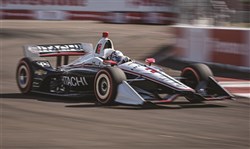
IndyCars, which will have the spotlight in August, produce 500-700 horsepower and can reach 240 miles per hour. Yet races are often won by one second or less.
“And they felt comfortable with our plan. IndyCar did, FIA approved it and the drivers are ecstatic about it. They think it’s cool,” Rittenberry says.
Cool. That’s the same description from Butch Spyridon, president and CEO of the Nashville Visitor and Convention Corp.
“They were looking for a way to have the track long enough and not close the city down for two or three weeks. And they found a pretty good alternative solution. It’s pretty cool,” Spyridon says.
How the race came about
Parker recalls a 2015 meeting in which city sports and business leaders convened to discuss “what are the next great sporting events” that Nashville can host. The gamut ran from All-Star games to the NFL Draft to outdoor hockey games – and IndyCar racing.
Political elections changed the pace of talks, he says, “but ultimately things really started to grab hold and gain momentum after the 2019 NFL Draft. That’s when (IndyCar) really started to kind of grab hold and started to take root.”
Crews says once the management team was in place, the next step was “putting together the financial backing of the ownership team behind it and that’s been a phenomenal group to see evolve and to get to know. This management team, this ownership team really give us a great opportunity to be very, very successful.”
Startup costs for the Music City Grand Prix will run in the millions, and to pull off the immense task it partnered with the Titans, established a relationship with MTSU for course construction, put together high-profile groups of owners and an advisory board, both consisting of leaders in the business, music and sports worlds and others.
Perhaps the biggest name among owners is Grammy Award-winning entertainer Justin Timberlake, a Memphis native whose clothing company William Rast sponsored British driver Dan Wheldon when he won the 2011 Indianapolis 500. Also part of that winning team were Big Machine Records CEO Scott Borchetta as a sponsor and Crews as part of the management team.
When listing prospective owners, Crews says, “I looked at it, like, who would be the perfect person to be part of it? There’s no bigger star in the world than Justin Timberlake … so it made a ton of sense. His team was very interested, so it kind of went from there.”
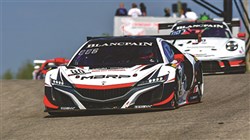
The GT Americas Series, which also will be racing on the Downtown Nashville course in August, features Acura (above), Aston Martin, Mercedes, Porsche, Lamborghini and other high-end cars.
Borchetta, a former driver who recently launched his own Xfinity Series team, isn’t the only Grand Prix owner with racing roots. There’s former driver and Cup Series team owner Justin Marks, driver and stunt coordinator Stanton Barrett and two-time Daytona 500 champion Dale Earnhardt Jr., who also owns an Xfinity team and works as a race analyst with NBC Sports.
Earnhardt was recruited to the ownership group by Knoxville’s Teddy Phillips, the CEO of Phillips and Jordan, Inc., a heavy construction company. Phillips says he met Earnhardt during a ski trip to Colorado.
“We started talking about it and things escalated through a period of time and up through his management team,” says Phillips, whose family owned Smoky Mountain Raceway in Maryville from 1962-75, hosting two Cup races annually. “(Earnhardt) just told me he’d like to be involved. He loves Nashville. So we are thrilled to have him on board with us along with the entertainment guys we’ve got in, like Justin (Timberlake).”
Among other owners: J.R. Hand, president/CEO of Hand Family Companies, Darby Campbell (owner, Safe Harbor Development), Kevin Clayton (Clayton Homes), and Pinnacle Financial Partners executive Andy Moats.
The Music City Grand Prix has also established a 15-person advisory board that includes, among others, Monica Fawknotson, executive director of the Nashville Sports Authority, Heather Brown, leader of MTSU’s prestigious School of Concrete and Construction Management, Shan Foster, former Vanderbilt basketball star, vice president for external affairs at the YWCA and executive director of Amend Together, and Hall of Fame singer/songwriters Kix Brooks and John Oates.
Crews says the assembled team impressed legendary IndyCar Series owner Roger Penske when they approached him about bringing a race to Nashville.
“He’s going to kick all the tires and really understand what he’s getting into for his Series. And I think his comfort level with the Titans’ involvement, our ownership team and our management team is why he saw this (race happening),” Crews says.
No taxpayer paving
The partnership with MTSU comes into play when looking at the costs for building the course. The school and students will be creating the barriers that line the course and pit row, using recycled materials, safer and lighter blends of concrete and better molds.
“We are working to create environmentally conscious concrete mixes while not sacrificing durability and strength for the race barriers and pit lane,” Brown says. “This partnership will create advanced learning experiences for students and expand our manufacturing relationships.”
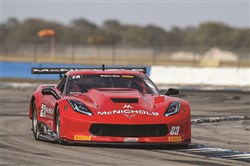
The Trans Am Series, which also will race downtown in August, features Corvettes, Mustangs, Jaguars and more with 850 horsepower engines and speeds topping out at 190 mph.
Crews says the city will not be on the hook for any costs related to the concrete paving necessary for the racecourse, the barriers or related construction.
“We’re taking 100% of the burden on that,” Crews says. “It’s been part of our vision from Day One. I’m a Nashvillian, and we want to be good corporate citizens. We’ve got great partners in that world and a lot of that comes through the MTSU relationship, so we’ll probably do it as efficiently as possible. But that is on our dime.”
Rittenberry, as COO, will oversee construction.
“Not only are we building those blocks and the fencing, but we’re also making significant repairs and improvements to the city property – whether that is on the city streets along the racecourse or some areas where we may have to move some curbs or some drains, or the street just needs a little repair,” Rittenberry says.
“The paving is all the way into the Nissan Stadium parking lot, which is going to be basically our pit area and our pit lane, so we’re tearing out a lot of the asphalt and replacing with concrete because the pit lane for the IndyCars have to have concrete to pit on.
“So there’s a lot of a lot of work and a lot of time and had a lot of dollars that’s going into building this and making this one of the best tracks in the country – and one of the safest.”
Coronavirus concerns
All plans are contingent on no further COVID-19 outbreaks and approval from Metro Board of Health. The SEC men’s basketball tournament was limited to 3,400 fans per session at 20,000-seat Bridgestone Arena, and June’s CMA Fest has already been postponed until 2022.
But vaccinations are increasing, downtown businesses are reopening and Gov. Bill Lee has declared the state open for tourists.
“I’m very optimistic that we’ll start to see real recovery in June and real activity in July and August to get back to some normalcy. And obviously, everything is predicated on the vaccine distribution,” Spyridon says.
“Right now, we continue to be very, very optimistic, very bullish on where we’ll be and ultimately – no pun intended – full speed ahead,” Parker adds. “We firmly believe and are expecting to be in a much, much better place come August (but) we’ll be prepared to do whatever makes sense at the appropriate time.”
Nashville Superspeedway executive Moses says he will work with Wilson County leaders and public health officials. Their grandstands hold 25,000 and they have plans to add temporary seating, assuming they get the go-ahead to be at full capacity.
“We certainly want to give as many folks from Middle Tennessee and the region an opportunity to experience our NASCAR weekend if possible. But we also want to do that in a very reasonable and responsible way,” Moses says. “We’re hoping that we’re in a much better place in June than we are here in early March.”
Superspeedway work rolling
Moses’ comments about the Coronavirus make this a good time to shift gears to the Ally 400.
Dover Motor Sports, which owns the track, has spent most of the past year refurbishing the facility, which was closed in 2011 after hosting Xfinity, truck and IndyCar races but never a top-tier Cup Series race.
“We’re making some progress on the facility itself which, having been largely dormant for 10 years, needs a little bit of help,” says Moses, who last August became the first Black man to be named president of any NASCAR track.
“As I like to say to people, if you left your home dormant and vacant for about 10 years, you’d have to do quite a few things before you invited your friends and family over to host them. And those are the kinds of things that we’re addressing right now.”
He says the track was in good shape and what paving was needed on the track apron and infield road course is already finished. Remaining work includes the race operations control room, fan suites and the suite tower, and the elevator lobby in that tower as well as the infield care center and a media center.
“So those areas we are making really good progress and we’re happy about that,” he adds.
Fairgrounds a hot topic
While there are several on-track events worth discussion, it’s the off-track developments that are generating the most attention. Mayor Cooper’s signature on the license of agreement with Bristol Motor Speedway is racing against time to get the deal approved by the Fair Board and Metro Council by July 31 or the agreement can be terminated by either party.
“We have an obligation to maintain the track, so it is smart for Nashville to engage a strong, long-term partner from the auto racing industry to operate it successfully,” Cooper says. “The business terms in this LOI (letter of intent) protect Nashville, with multiple revenue streams to make this a financial success. We can put this landmark back on the national stage. I look forward to working with the Fair Board and the Metro Council in the months ahead (to gain approval of the deal).”
Marcus Smith, the president and CEO of Speedway motor sports, which owns Bristol and seven other speedways, says Nashville race fans deserve a renovated track that will complement the soccer stadium and the growing Wedgewood-Houston neighborhood.
“We can work together to transform Nashville Fairgrounds Speedway into an amazing multipurpose entertainment destination … and breathe new life into a venue that has a legendary status in auto racing history,” Smith says.
The Fair Board Commissioners held a virtual public hearing March 9 and Commissioner Jason Bergeron says approval must clear several hurdles, including community impact and noise reduction.
“Everyone knows we have a lot of work ahead of us to find something workable,” Bergeron says. “We certainly don’t have 100% agreement right now but … we have common recognition of needs around community impact.”
If the Fairgrounds deal gets approval, it would put two NASCAR tracks within 40 miles of each other, a point Superspeedway executive Moses calls “an embarrassment of riches.
“It’s all racing but it’s also kind of different,” Moses adds. “If their track were a mile-and-a-half or a superspeedway like ours, I’d be more concerned about it because you wouldn’t be able to distinguish racing as well.”
Newgarden lack of advantage
Now in his 10th season on the IndyCar circuit, Newgarden has 18 career wins, including four last year, and won Series championships in 2017 and 2019. He was runner-up last season and hopes to move up one notch this season for his third title. He is also seeking his first Indy 500 victory and would like to take the checkered flag in the Music City Grand Prix, a course that’s only about 8 miles from his home.
Asked about a competitive advantage, Newgarden laughs.
“Yeah, maybe a little bit,” he says. “Because I live here, I get to check in on the course a little better than most other drivers.
“These drivers are the best of the best, and it doesn’t them take very long to learn a new circuit. Once we start going during the race weekend, you’re going to see people catch on pretty quickly to what’s going on.”
Crews downplays any competitive advantage for Newgarden on a course he could drive practically every day in his personal car.
“An IndyCar at speed is different than any kind of experience that you could do in any kind of passenger car,” he explains. “The teams are so good that they’ll all have computers simulations built long before. These guys will have hundreds of laps in the simulator on the track before the (Nashville) track’s ever built.
“Josef is one of the best road course racers in sports so you would have to put him high on the list of favorites, that’s for sure.”
So, move over, Daytona. Out of the way, Indianapolis. Here comes Nashville, strong on the outside lane.